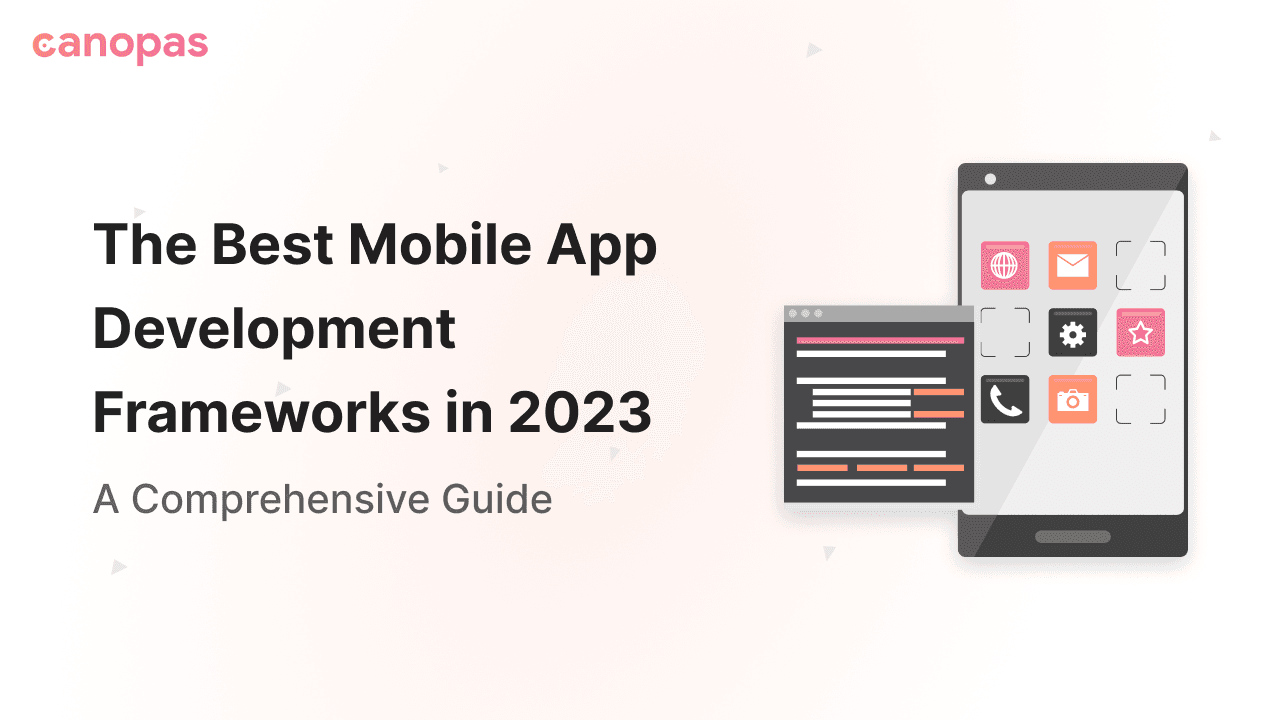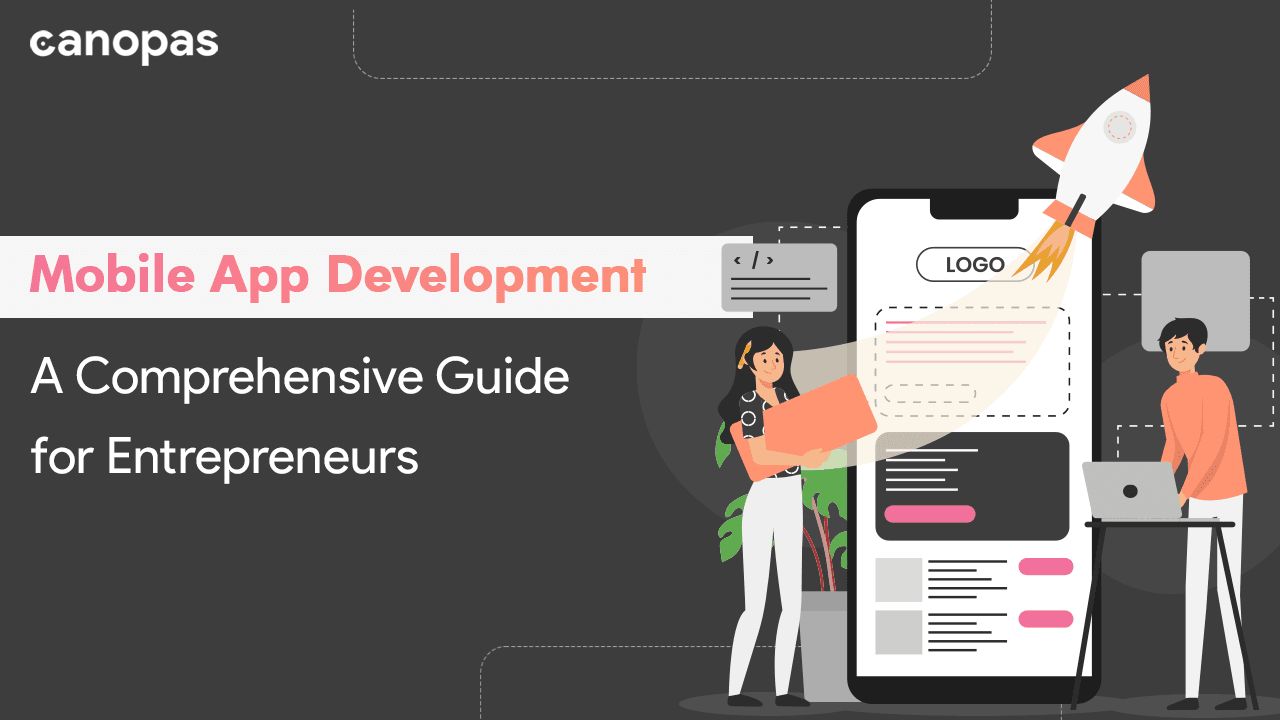
Best Mobile App Development Frameworks in 2023
Mobile App Development - Overview
In the dynamic world of mobile technology, the tools and techniques we use to create transformative apps are ever-evolving.
As we stand on the threshold of 2023, businesses and developers alike face an expansive and sometimes overwhelming array of choices when it comes to selecting the perfect framework for their app's creation.
But why is this choice so pivotal?
Choosing the right framework is akin to selecting the foundation for a building. A sturdy and apt foundation ensures not only the building's longevity but also its ability to withstand challenges and adapt to changes.
Similarly, a mobile app development framework lays the groundwork for the app's performance, user experience, scalability, and overall success in the competitive market.
Throughout the past decade, we've witnessed rapid changes in the mobile app landscape.
From simple, native apps to complex, cross-platform solutions, and now the rise of progressive web apps, the journey has been nothing short of revolutionary.
In this comprehensive guide, we will delve deep into the top mobile app development frameworks that are setting the benchmark in 2023. We'll explore their strengths, potential pitfalls, and the kind of applications they're best suited for.
Whether you're a seasoned developer aiming to stay updated, a business owner keen on making informed decisions, or a newbie stepping into the world of mobile app development, this guide is curated to offer valuable insights into the frameworks that are shaping the digital future.
Criteria for Evaluating a Mobile App Development Framework
Choosing the optimal framework for your mobile app is more than just picking the most popular or latest tool in the market.
It involves a careful assessment of various parameters that ensure your app not only stands out but also stands the test of time.
Let's explore the key criteria you should consider.
Performance & Efficiency
- Speed: How swiftly can the framework execute tasks and respond to user interactions?
- Optimization: Does it allow for optimization techniques that ensure the app runs smoothly on diverse devices?
- Resource Consumption: How efficiently does it utilize device resources like CPU and memory?
Flexibility & Scalability
- Modularity: Can you add or modify features without rewriting significant portions of the code?
- Growth: Does it support your app's potential growth in terms of user base, features, or data volume?
Platform Support (iOS, Android, Web)
- Cross-Platform Capability: Can it create apps that work seamlessly across multiple platforms?
- Native Features Access: How well can it tap into device-specific features and functionalities?
Developer Community & Support
- Community Size: A robust developer community often indicates a well-adopted framework. This can be beneficial for troubleshooting, tutorials, and shared resources.
- Documentation: Comprehensive, clear, and up-to-date documentation is vital for swift and effective development.
- Updates: How frequently is the framework updated to accommodate new technologies and rectify bugs?
Cost Implications
- Licensing Costs: Are there any fees associated with using the framework?
- Development Time: Does the framework streamline the development process, potentially saving time and labor costs?
- Maintenance Costs: Consider the potential long-term costs associated with updates, troubleshooting, and compatibility.
Integration Capabilities
- Third-Party Services: How easily can it integrate with external services like databases, cloud storage, or payment gateways?
- Plugins & Extensions: Is there a rich ecosystem of plugins or extensions that can enhance your app's capabilities without reinventing the wheel?
Making an informed decision based on these criteria ensures that your mobile app is built on a foundation that aligns with your goals, caters to your target audience's needs, and is ready to adapt and evolve in the fast-paced digital world.
Overview of Different Types of App Development Frameworks
In the multifaceted domain of mobile app development, frameworks come in various flavors, each catering to specific needs and offering unique advantages.
It's essential to understand these broad categories before diving into the specific tools, as the right choice often depends on the desired app characteristics, target audience, and overall objectives.
Here's a succinct overview.
Native Frameworks
- What are they?: Native frameworks are designed for building apps for a specific operating system, most commonly iOS or Android.
- Advantages:
- Optimized Performance: Being tailored for a particular OS, native apps often provide faster performance and a smoother user experience.
- Access to Device Features: They can fully leverage device-specific functionalities, like camera, GPS, or notifications.
- Consistent UI/UX: Adherence to platform-specific design guidelines ensures a familiar look and feel for users.
- Drawbacks:
- Separate Codebases: If you're targeting both Android and iOS, you'll likely have to maintain two distinct sets of code.
- Development Time: Building native apps might require more time compared to cross-platform solutions.
Hybrid/Cross-Platform Frameworks
- What are they?: These frameworks allow developers to write code once and deploy it across multiple platforms, like iOS, Android, and sometimes even web.
- Advantages:
- Cost-Effective: A single codebase means reduced development and maintenance costs.
- Faster Time to Market: Simultaneously launching on multiple platforms can be swifter.
- Consistency: Uniformity across platforms, ensuring a consistent brand presentation.
- Drawbacks:
- Performance: Might not be as optimized as native apps in some cases.
- Limited Access: Certain platform-specific features might be challenging to integrate.
Progressive Web Apps (PWAs)
- What are they?: PWAs are web applications that function similarly to native apps, providing features like offline capabilities, push notifications, and home screen icons.
- Advantages:
- No App Store Approval: Bypasses the traditional app store approval processes.
- Updates: Direct and swift updates without requiring user downloads.
- Reach: Provides an app-like experience across devices without installation.
- Drawbacks:
- Limited Device Features: Might not access all native functionalities.
- Perception: Some users may still prefer the 'authenticity' of a native app experience.
The Best Mobile App Development Frameworks of 2023
The mobile app development sector has witnessed a myriad of frameworks, but certain names stand out due to their efficiency, versatility, and robustness.
Here are some of the best frameworks that are setting the benchmark in 2023.
React Native
- Brief Description & Background
- Created by Facebook, React Native empowers developers to construct high-quality apps for both Android and iOS using JavaScript and React.
- Key Features & Capabilities
- Hot Reloading for real-time code updates.
- Vast component library for accelerated development.
- Seamless integration with native modules.
- Pros
- Rich ecosystem and substantial community support.
- Cross-platform with a native feel.
- Flexible and modular architecture.
- Cons
- Occasionally faces performance issues with complex animations.
- Requires native modules for advanced features.
Flutter
- Brief Description & Background
- Flutter, a brainchild of Google, is renowned for crafting visually appealing apps from a single codebase for mobile, web, and desktop.
- Key Features & Capabilities
- Widget-based architecture for customizable UI.
- Dart programming language enhances performance.
- Robust tooling with hot restart.
- Pros
- Highly expressive and flexible UI.
- Rapid development cycle with reduced code.
- Strong community and regular updates.
- Cons
- Relatively newer, hence fewer third-party packages.
- Larger app size.
Kotlin Multiplatform
- Brief Description & Background
- Kotlin Multiplatform, from JetBrains, shines in allowing shared code, logic, and UI across platforms.
- Key Features & Capabilities
- Share code across Android, iOS, and web.
- Intuitive language syntax with type-safety.
- Seamless integration with native libraries.
- Pros
- Encourages code reuse without compromising native experience.
- Growing community and support.
- Integrates well with existing projects.
- Cons
- Still maturing in terms of libraries and tooling.
- Might require expertise in both Kotlin and native languages.
Xamarin
- Brief Description & Background
- Backed by Microsoft, Xamarin offers a rich development environment using .NET and C# for iOS and Android apps.
- Key Features & Capabilities
- Native performance through hardware acceleration.
- Extensive library of user interface controls.
- Access to .NET libraries and tools.
- Pros
- Reusable code across platforms.
- Strong integration with Microsoft products.
- Active developer community.
- Cons
- Larger app sizes compared to native apps.
- Occasionally, lagging behind native platforms in terms of new features.
Apache Cordova (Previously PhoneGap)
- Brief Description & Background
- Cordova offers a platform to build native-like mobile apps using HTML, CSS, and JavaScript.
- Key Features & Capabilities
- Plugin architecture to access native device capabilities.
- Wrapper for web apps with a native shell.
- Extensive plugin library.
- Pros
- Use existing web development skills for mobile app creation.
- Rapid prototyping and deployment.
- Cross-platform compatibility.
- Cons
- May not match the performance of native apps.
- Relies heavily on plugins for advanced features.
Ionic
- Brief Description & Background
- A versatile framework, Ionic lets developers create feature-rich apps using web technologies, integrated with Cordova and Capacitor for native functionalities.
- Key Features & Capabilities
- Component-based UI architecture.
- Built-in DevApp for easy testing on devices.
- Strong integration with Angular, React, and Vue.
- Pros
- One codebase for any platform.
- Access to native device features.
- Vibrant community and extensive plugins.
- Cons
- Some performance overhead compared to native solutions.
- Needs Cordova or Capacitor for native access.
These frameworks represent the pinnacle of mobile app development in 2023. Depending on your project's requirements, budget, and timeline, each has its unique offerings to ensure the best results.
Remember to keep an eye out for updates, as this landscape is ever-evolving.
Choosing the Right Framework for Your Project
The mobile app market is fiercely competitive, and the right framework can play a pivotal role in setting your project up for success.
Making an informed choice is about more than just following industry trends; it's about aligning the framework's capabilities with your project's distinct requirements.
Let's delve into the nuances of this selection process.
Factors to Consider Based on the Project's Needs
- Nature of the App
- Is your app a game, an e-commerce platform, or a productivity tool? Different frameworks excel in different niches. For instance, while a framework like React Native might be versatile across categories, you'd lean towards Unity for game development.
- User Experience Expectations
- Do you aim for a highly interactive and smooth UI? Native frameworks often offer superior performance and responsiveness. However, many modern hybrid frameworks have bridged this gap considerably.
- Development Time
- If speed is of the essence, opting for frameworks that promote code reusability across platforms can expedite the development process.
- Budget Constraints
- The cost isn't confined to just development. Licensing, maintenance, and potential scaling can impact your budget. Open-source frameworks might have an edge in the initial stages, but assess the long-term expenses.
Importance of Considering the Long-term Viability and Support of the Framework
- Future Support
- In the tech world, today's cutting-edge tool can be tomorrow's relic. Research if the framework's developers have a roadmap for future updates and improvements.
- Community Vibrancy
- A thriving community can be a sign of the framework's longevity. Active forums, regular meetups, and third-party plugins and tools indicate continued interest and support.
- Backward Compatibility
- As your app grows, you'll inevitably update and refine it. Ensure that your chosen framework's newer versions will be compatible with the older ones.
Potential Pitfalls to Avoid When Selecting a Framework
- Being Swayed by Hype
- New frameworks might generate buzz, but that doesn't guarantee their endurance or suitability for your project. It's crucial to differentiate between genuine value and fleeting popularity.
- Overlooking the Learning Curve
- Even a powerful framework can stall your project if your team struggles to grasp its nuances. Assess your team's expertise and the framework's complexity.
- Neglecting Integration Needs
- If your app heavily relies on third-party services or specific back-end systems, ensure that the framework can seamlessly integrate with these without convoluted workarounds.
Choosing a mobile app development framework is akin to laying the foundation of a building.
A robust and fitting choice can propel your project, ensuring scalability, user satisfaction, and cost-effectiveness. As you navigate this decision, prioritize your project's intrinsic needs, and long-term vision.
Conclusion
In the rapidly advancing landscape of mobile app development, the right tools, knowledge, and practices are invaluable.
While frameworks provide the backbone, understanding the nuances of selection and utilization can set your projects up for success.
Furthermore, staying updated with the latest trends ensures that your applications resonate with modern users and leverage the best the industry has to offer.
Navigating this intricate journey can be daunting, but with the right resources and a proactive approach, any challenge can be turned into an opportunity.
The mobile world waits for no one, but by arming yourself with insights and strategies detailed in this guide, you're poised to lead and innovate.
Ready to Elevate Your Mobile App Game?
Dive deeper with Canopas! Whether you're planning your next big app or looking to refine your existing ones, our expert team is here to help.
From consultation to development, we're your partners in success. Contact Us Today and Let’s Shape the Future Together!








Let's Work Together
Not sure where to start? We also offer code and architecture reviews, strategic planning, and more.
